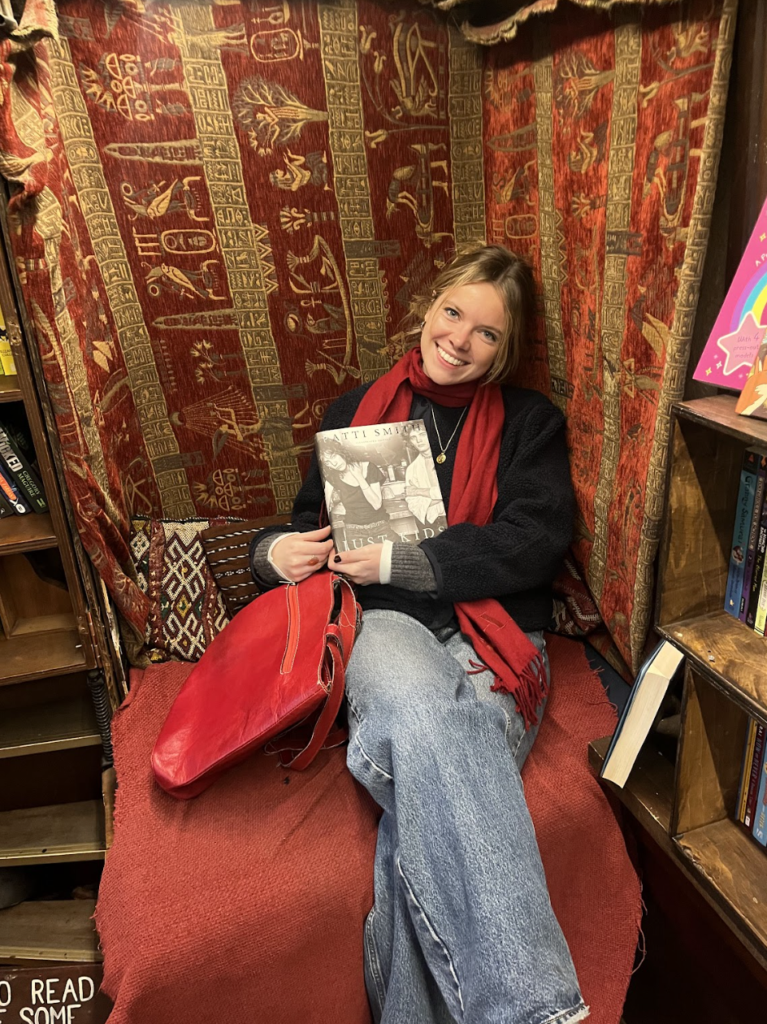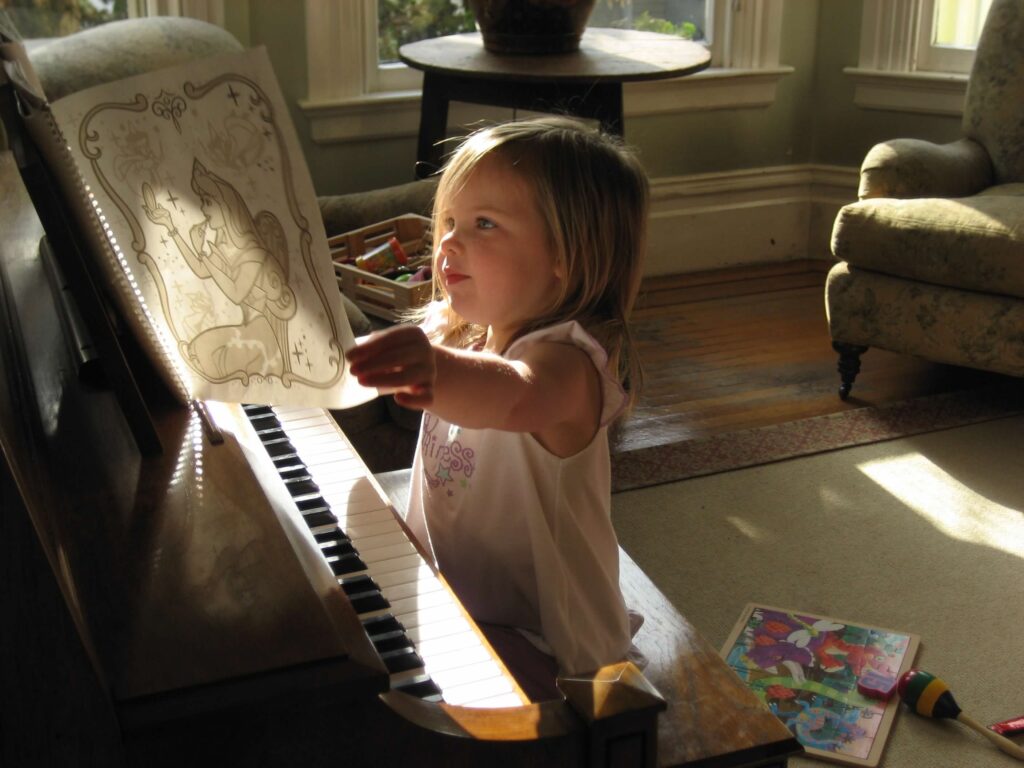
Me with a copy of one of my favorite books “Just Kids.” Author Patti Smith is both an artist and activist who regularly speaks out against President Trump. (Stella Mullin / Daily Nexus)
My dad owns too many guitars. I am lucky enough to say that I grew up in a house where weekends were not for sleeping in, but far from it. My Saturday mornings were filled with pop music wafting in from outside, where my mom was practicing her dance routine, and the methodic strumming of my dad playing yet another Wilco song. During the COVID-19 pandemic, when I had far too much time on my hands, I picked up the guitar. It was short lived, but I still proudly say I know “G, C, D.”
While my career as a musician was not promising, my future as a writer was solidified in third grade. For the past 10+ years, books have been my best friends. There was a time when I was the kid who sat in a corner during recess, happily content with my nose between the pages. That 8-year-old girl would be terrified to learn what the future of the arts looks like now.
On Feb. 10, 2025, President Donald Trump appointed himself board chair of the John F. Kennedy Center for the Performing Arts — a surprising move given that, during his first term, he refused to attend the annual Kennedy Center Honors ceremonies. Additionally, historically, presidents have had little direct involvement with the center since it opened in 1971. The Kennedy Center is a national performing arts institution in Washington, D.C., putting on performances in ballet, theater, opera, dance and orchestra. As a result of Trump’s interference, the Kennedy Center has a chairman who has no interest in their core values. At the time of his self-appointment, Trump had never even been to a show at the Kennedy Center.
In an interview with National Public Radio (NPR)’s “Consider This,” Deborah Rutter, previous president of the Kennedy Center, expressed her sadness over the change in leadership.
“The Kennedy Center is meant to be a beacon for the arts in all of America across the country,” Rutter said. “And we have worked so hard and accomplished so much over this last decade to really broaden the programming, to invite all manner of arts and artists to our stages, and we’ve expanded our audience as a result. I pray that that can be sustained, but that’s my biggest concern.”
The Kennedy Center hosts over 2,000 performances for 2 million audience members every year. Some artists and performers have already left the center in response to Trump’s values — for instance, he posted on social media platform Truth Social that he aims to stop all shows featuring drag performers, making “the Kennedy Center in Washington D.C., GREAT AGAIN.”
In a recent press release, Qommittee, a national community of drag artists, responded to Trump’s intent to eradicate drag artists from the center.
“This is about who gets to exist in public spaces and whose stories get to be told on America’s stage,” they wrote. “Banning an entire art form is censorship, plain and simple. Americans don’t have to agree on everything, but we should be able to speak our minds and perform our art without bans, retaliation, or intimidation.”
I am from the Castro District in San Francisco, a historically LGBTQ+ neighborhood donning rainbow striped sidewalks and flags, complete with a bakery named Hot Cookie that sells both genitalia-shaped desserts and underwear with their logo on it. For as long as I can remember, people in drag walked the same streets I walked to school. My weekly donut runs with my mom and sister wouldn’t have been complete without sitting next to drag artists gearing up for another weekend festival. Drag is woven into the fabric of the Castro, and I cannot imagine growing up without it.
Trump’s takeover of the Kennedy Center and his attack on drag does not even begin to describe his threat to the arts. Dating back to his first term as president, he has consistently attempted to defund the National Endowment for the Arts (NEA), National Endowment for the Humanities (NEH) and the Corporation for Public Broadcasting, which supports media outlets like the Public Broadcasting Service and NPR.
In Trump’s previous presidency, I would hear countless people saying that the decisions he was implementing did not directly affect their lives, so they did not feel the urge to pay attention. Trump’s attempts to defund programs like NPR affect the lives of every American. Journalism is commonly regarded as the fourth pillar of the United States government, a hopeful check on not only the president, but also on the Supreme Court and Congress.
While any measures aimed at harming the NEA, NEH or Corporation for Public Broadcasting were never passed during his first term, his second term has seen massive cuts. The Trump administration has started cancelling NEA grants, even going so far as to proposing a complete elimination of the NEA.
When I was in elementary school, I remember learning that arts programs are usually the first targets of funding cuts. I really loved American Girl Dolls, and one of my favorite stories was Saige, who fought to save her school’s art program after it had been cut. It was hard for me, someone who grew up in a family who put the arts before anything else, to understand why people would willingly take away creative outlets.

Me playing the piano in my childhood home. My dad played the guitar and I played the same piano during COVID-19. (Stella Mullin / Daily Nexus)
In a society focused on technology and, now, on developing better AI programs, creativity is one of the only things that cannot be replicated by a computer. Creativity is human.
Although the NEA is the largest funder of the arts in the United States, it is also one of the smallest federal agencies. Americans for the Arts, another program supporting creatives across the country, expressed concern for the future of the NEA.
“The NEA plays a vital role in the lives of millions of Americans and the thousands of nonprofit and governmental arts and cultural organizations that bring America’s story to life,” Erin Harkey, CEO of Americans for the Arts, said in a May 2025 statement.
American Federation of Musicians (AFM) Local 802, New York City’s musicians union, also spoke out against Trump’s attempt to eventually eliminate the NEA.
“This is a dark day for the independence of the arts and musicians across the country — and it is an attack on American excellence and creativity,” Bob Suttmann, president of AFM Local 802, said in a May 2025 statement. The surge in statements can only mean one thing: people will fight back against this defunding. The Open Letter Rejecting Presidential Attacks is just one of the many ways people are combating Trump’s defunding. The letter, signed by over 3,000 organizations, aims to protect and advocate for charitable organizations across the country, including the arts.
To the Isla Vista residents reading this: We are lucky to live in such a creative community. Take a second to look at the murals on campus, enjoy a band show, take advantage of the pottery classes the Recreation Center offers or any of the performances put on by student groups. The little girl who read books by herself in the playground corner now reads books on the library lawn; listens to KCSB-FM 91.9, UC Santa Barbara’s radio station; goes to as many live shows as she can and takes creative writing classes offered by the University. Take advantage of the arts while you still can. And go hug an artist!





















So well written, educational and interesting .